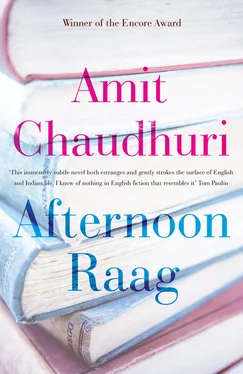Amit Chaudhuri - Afternoon Raag
Здесь есть возможность читать онлайн «Amit Chaudhuri - Afternoon Raag» весь текст электронной книги совершенно бесплатно (целиком полную версию без сокращений). В некоторых случаях можно слушать аудио, скачать через торрент в формате fb2 и присутствует краткое содержание. Год выпуска: 2015, Издательство: Oneworld Publications, Жанр: Современная проза, на английском языке. Описание произведения, (предисловие) а так же отзывы посетителей доступны на портале библиотеки ЛибКат.
- Название:Afternoon Raag
- Автор:
- Издательство:Oneworld Publications
- Жанр:
- Год:2015
- ISBN:нет данных
- Рейтинг книги:3 / 5. Голосов: 1
-
Избранное:Добавить в избранное
- Отзывы:
-
Ваша оценка:
- 60
- 1
- 2
- 3
- 4
- 5
Afternoon Raag: краткое содержание, описание и аннотация
Предлагаем к чтению аннотацию, описание, краткое содержание или предисловие (зависит от того, что написал сам автор книги «Afternoon Raag»). Если вы не нашли необходимую информацию о книге — напишите в комментариях, мы постараемся отыскать её.
Afternoon Raag — читать онлайн бесплатно полную книгу (весь текст) целиком
Ниже представлен текст книги, разбитый по страницам. Система сохранения места последней прочитанной страницы, позволяет с удобством читать онлайн бесплатно книгу «Afternoon Raag», без необходимости каждый раз заново искать на чём Вы остановились. Поставьте закладку, и сможете в любой момент перейти на страницу, на которой закончили чтение.
Интервал:
Закладка:
She was, essentially, a lonely person searching for the right company, a wise little girl in a woman’s body, dressed in black trousers, a blue top and a coat, and black sneakers. Her hair was long and striking and untidy; solemnly, she carried a file full of papers under her arm, and a clumsy, oversized bag whose significance was that there was a tiny packet of Marlboro Lights in it. She had been married once, very briefly, and then divorced; later, she had an involvement in Oxford which came to nothing. It was towards the end of this involvement that I first met her, through a friend, and then we would exchange nods when we passed each other by on the bicycle-lined pavement of a street which led to a pub and a junction. Students, drolly crossing the street, or lavishly arguing, filled out the spaces in the street and the time between one meeting and the other upon this repeated route, so that the street, with its daily, inconsequential academic excitement and drama, has become indissoluble from the inner life of our early meetings, and Oxford, its climate and architecture, seems not so much a setting as a part of the heart of our friendship.
By the time she would get up to leave, the rest of the building would have woken up and be moving about. Noises were transmitted through walls and doors; a radio; a knowing, crowded murmur in the kitchen; footsteps in the corridor; the main door shutting; the firm but almost non-physical sound of footsteps on the gravel; there were many lives in the building made transiently one by sound. I had a feeling of being surrounded, as on a ship or a train, by personal routines and habits that would not be known again, that had their natural place in some larger, more fixed habitat, and the morning noise had about it, therefore, the concentratedness, the temporariness, and the pathos of the noise of shared travel. It was at this time, after the sun had risen, and lives, without apparent reason, once more began excitedly, when there was shouting upstairs, windows opening, last-minute preparations, and a joy akin to that felt by passengers approaching a port, that Shehnaz would get up to leave, listening, with one ear, to the voices of other students, smiling at what they were saying. Everything they said she found worth listening to, especially if she had had a happy morning with me; she had an uncanny sensitivity to the presence of people in small spaces, in corridors, in doorways, as others have to landscapes, or to places. Being there in that corridor at that moment, as students sheepishly came out of rooms and vanished into the kitchen or the toilet, was a real experience for her.
Sharma lived in another room in the same building. Sometimes, in the morning, he would come down in his shorts to have coffee with me. Banging on the door in a forthright manner, he would enter, and if I happened to be midway through practising a raag, he would sit quietly on a chair and nod and shake his head in vigorous appreciation as I sang. The irrepressible bodily meaning of the words ‘to be moved’, which we have come to associate with mental and aesthetic response, was apparent when one looked at him listening to music. Sometimes he would keep rhythm to the song, arbitrary temporal divisions that he slapped and pounded on the table, and when I had finished he would still be doing this, as if he could no longer stop. Later, he would walk around the room possessively, tapping the keys of my typewriter and reading aloud all the titles of the books on my shelf in order to make himself more conversant with the English language.
Once or twice, it happened that I had gone outside, leaving my door open, and then returned and closed it, thinking I was alone. But Sharma, in the meanwhile, had come and hidden himself in the clothes-closet, from which, at a given moment, he emerged explosively. Towards the beginning of our friendship, he had told me very seriously that I was to help him improve his English. He was writing a thesis on Indian philosophy, but he longed to be a stylist. I would, thus, recommend to him a book whose language had given me pleasure, and he would read aloud passages from Mandelstam or Updike or Lawrence to me, either in the morning or at midnight, times at which I was sleepy, he reading sonorous lines in a loud and unstoppable voice, interrupting himself only to demand comments from me that were both fair and encouraging. His English had a strong, pure North Indian accent, so that he pronounced ‘joy’ a little bit like the French ‘joie’, and ‘toilet’ like ‘twilit’. Yet this accent, I soon learnt, was never to be silenced completely; it was himself, and however he trained himself to imitate the sounds of English speech, ‘toilet’, when he pronounced it, would always have the faint but unmistakable and intimate and fortunate hint of ‘twilit’. His sentence constructions were curious, with missing articles and mixed-up pronouns, but he compensated for these with an excess of ‘Thank yous’ and ‘Sorrys’, two expressions gratuitous in Indian languages, and therefore, no doubt, of great and triumphant cultural importance to him. His reading practice in the mornings, executed with the single-mindedness of a child practising scales by thumping the keys, remains for me one of the most relaxing memories of Oxford; me lying on the bed and patiently listening, a time of rootedness and plenitude, even of equable solitude, for with Sharma one is always alone, listening to him. Mandelstam, read by Sharma, took on a different, unsuspected life, odd, cubist, harmlessly egotistical, and atmospheric.
3
Mandira lived in a room in college. She had come to Oxford two years after me, and I first saw her in hall. She spoke English, I noticed, with a slight American accent, talked actively at the table, walked in what is called ‘a brisk manner’, and was surrounded by English friends. She was small and roundish, and a favourite with the porters and stewards, who would wink at her, or put an arm around her, and call her ‘love’ or ‘dear’, as the English do, and not take her very seriously. I did not like her, but, when I was bored, I would go to her room and drink a cup of tea. I gradually got over my tentativeness, and came to realize that a knock on her door would not be unwelcome, for she was always very hospitable in her disorganized way. The first five minutes would be spent in me settling down, after a preamble during which I decided where I should sit, on the armchair in a way that was both tortured and patient, and then open a bantering conversation with her in medias res; all this I took to be courtesy, but it made her uncomfortable, for I remember her as a compound of movement and aimless speed, putting the kettle on the boil, and then running down a flight of stairs to the kitchen for her carton of milk. Shyness made her quick, while I, by contrast, was slow. When she was gone for that minute, I would be alone in her room, with the photographs on the wall, the secret things and cups and clothes in her cupboard, the badly made bed, the washbasin and mirror, the textbooks on the table and the floor, absorbing the materiality of the room and also its cheerful, fleeting makeshiftness, and not knowing what to think. She was not a very tidy person, but her attempt at order and creating the semblance of a household, even the clumsy tear at the spout of the milk-carton, touched me. These undergraduate rooms were larger and more comfortable to look at than the box-like, modern rooms in my building. A light hung from the ceiling, enclosed by a comical, globe-like shade, and at evening it gave a light that was both encompassing and personal. The window opened on to a path to the garden and the hall, and all day, laughter and footsteps could be heard, coming and going, and these sounds too became a part of the room’s presence.
In the morning, I looked forward to the small journey I made across the road, glancing right and left with avid interest for oncoming cars, to see if I had any mail. The pigeon-holes, after the poverty of Sunday, its forced spiritual calm, seemed to overflow humanely with letters on Monday, and even if I had not got any, that small walk did not lose its freshness and buoyancy, and a tiny and acute feeling of hope did not desert me in all my mornings. From about half past nine to ten, there was a hubbub as students stooped or stood on tiptoe to peep into pigeon-holes, and sorted and sifted letters, and the mail-room had an air of optimism, of being in touch with the universe, found nowhere else in Oxford. When there were letters for me — the cheap, blue Indian aerogrammes from my mother — they lay there innocently like gifts from a Santa Claus, they did not seem material at all, but magical, like signs. Then I would miss the special feeling of mornings at home, I would think benignly of my mother’s good health, and how she suffers from nothing but constipation, how for three days she will go without having been to the toilet, with an abstracted look on her face, as if she were hatching an egg. Secretively, she will concoct a mixture of Isab-gol and water, and stir it ferociously before drinking it. Then, one day, like a revelation, it will come, and she will have vanished from human company. My father, a great generalizer, collector of proverbs, shows no concern over her health, displays no bitterness.
Читать дальшеИнтервал:
Закладка:
Похожие книги на «Afternoon Raag»
Представляем Вашему вниманию похожие книги на «Afternoon Raag» списком для выбора. Мы отобрали схожую по названию и смыслу литературу в надежде предоставить читателям больше вариантов отыскать новые, интересные, ещё непрочитанные произведения.
Обсуждение, отзывы о книге «Afternoon Raag» и просто собственные мнения читателей. Оставьте ваши комментарии, напишите, что Вы думаете о произведении, его смысле или главных героях. Укажите что конкретно понравилось, а что нет, и почему Вы так считаете.












